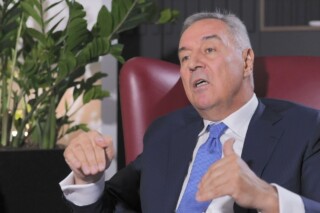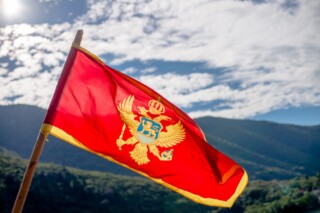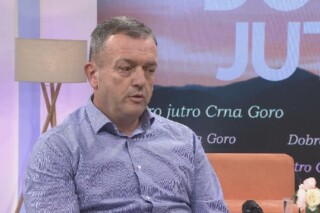Kaćuša Krsmanović
Metropolitan Bishop of Montenegro and the Littoral, Mr Amfilohije Radović, and Metropolitan of the Montenegrin Orthodox Church, Mr Mihailo, can put into the practice the initiative launched by the President of Montenegro, Mr Milo Đukanović, and unite in the formation of a unique orthodox church in our country, says Dr Čedomir Bogićević, the law theoretician, former judge of the Supreme Court, President of the Senate of the Doclean Academy of Sciences, the first winner of “Akademic Mijat Šuković” award and member of the Legal Council of the Montenegrin Orthodox Church.
Mr Bogićević is also member of the Editorial Board of prestigious scientific American magazine “International journal of language and linguistic,” headquartered in New York. In an interview for Pobjeda, he says that Mr Đukanović’s initiative is visionary, but putting it into effect will take time.
“It’s supposed to be the subject of wise heads of philosophers, enlighteners,theologians… It must have clear constitutional conditions of unity stipulating that all churches, all orthodox forms of religious communities, should preserve their identity. Uniting does not mean erasing religious identity, it’s uniting into one religious community where everybody can stick to their own dogmas”, points out Dr Bogićević.
He warns that hatred flaring up in the Montenegrin Parliament must be stopped.
“That’s the most tragic phenomenon of the Montenegrin society. Our greatest social and political forum is gripped by this disturbing phenomenon”, says Dr Bogićević.
POBJEDA: Identity and national questions of Montenegro are the focus of your scientific work. These questions haven’t been resolved not even after 14 years of the renewal of independence. Why?
Dr Bogićević: National and identity questions are essential, substantial, constitutional features of self-definition and self-commitment. Without firmly constituted basis, no human community can be recognizable. At the time when religious wars and colonialism were raging, when chauvinism, fascism and nazism were emerging, Montenegrin people didn’t suffer. As free people, consistent in the belief that freedom is a constitutional condition for their survival, they cherished their self-born and unique institutions which gave them cultural and national identity and autonomous right to arrange social relations independently.
That right, together with the moral code (honestas heroica montenegrina), is an expression of a great system of social regulation as a unique ethical view on the world of free people. The Corfu Declaration (1917) envisaged disappearance of Montenegrin nation, Montenegrin church and state. Imperial request and hegemony of Great Serbian self-government are to be blamed for that, but also Montenegrin government and Montenegro itself.
POBJEDA: Why are identity questions still burning?
Dr Bogićević: Devastating consequences of 1918 will be manifested in the forthcoming centuries too. Anti-bureaucratic revolution, the third Great Serbian uprising, has destroyed the Montenegrin identity. Montenegro is drowned into the great Serbian project aimed at ethnic cleansing of Albanians, Muslims, disappearance of Montenegrin people and Montenegro, their assimilation, occupation of Croatia and Bosnia and Herzegovina…
The main cause is the fact that contemporary Montenegro is anti-Montenegrin in its cultural spirit, it’s basically misanthropic, it does not recognize national, cultural and spiritual identity of Montenegrin people and other people living in Montenegro. Montenegrin administration is caught in the Greater Serbian ideology.
POBJEDA: Use of Montenegrin language hasn’t lived either. Why’s that?
Dr Bogićević: Montenegrin language has been regulated and constituted only formally. It’s not used by and Montenegrin institution or medium. As if we were ashamed of our language. Montenegrin identity is now being undermined through new scientific and cultural phenomena.
Montenegrin nation and its ethnic being is threatened by assimilation. Our cultural, academic and scientific institutions don’t cherish national and cultural identity, they neglect it, seems like they don’t want to deal with it. The whole education policy boils down to crafts. It’s all pure material facts. A man is regarded as means for making profit and generating capital and that’s all. That concept erases any identity mercilessly since in such societies a man is not an objective.
POBJEDA: Do you think that institutions, intellectuals and academic community did enough to base this country on real values?
Dr Bogićević: Today’s idea of the rule of law is a mere principle of legality. People are deprived of their substantial right to build their autonomous relations on their own. Two phenomenon: Montenegrin common law and Montenegrin moral code are lost. A new principle has emerged: a law which does not protect justice is not a law.
POBJEDA: After 26 years of the renewal of Montenegrin Orthodox Church, the issue of its status was put on the agenda of Montenegrin authorities. President Đukanović has pledged his support for the official autocephaly renewal and then he offered some sort of platform for settling this issue through uniting Orthodox people in one orthodox church. What’s your opinion of that idea?
Dr Bogićević: Montenegrin Orthodox Church has been autocephalous since 1767, with the abolition of the Patriarchate of Peć. Autocephaly is not obtained by tomos. It’s just a canonical declarative norm, a document. Montenegrin church never wanted the tomos. Its tomos is reflected in 11-century long bloodshed.
POBJEDA: What do you think about Mr Đukanović’s idea?
Dr Bogićević: His proposal is very wise, ecumenical and philanthropic. However, a long and hard work is ahead. These two churches really are completely different. Serbian church is sovereign, more powerful than the country. It’s a political subject that has other interests aimed against Montenegrin people…It negates the existence of anything called Montenegrin. On the other side, Montenegrin church is not strictly national. It’s a church of social community, of all people living on the Montenegrin territory.
Mr Đukanović’s idea isn’t conceptually developed yet. Firstly, under what substantial conditions can the churches be united? This idea should be thoroughly considered and it has to set out clear-cut constitutional requirements. It’s a reconciliation idea.
It is necessary to create conditions for making such unity possible. The key thing is to cut the ties Serbian Orthodox Church has with the Patriarchate of Belgrade, which is possible, following the cuius region, eius religio principle. That church must be autonomous expression of a religious organization of a religious life of Serbian people in Montenegro.
POBJEDA: Can you picture Metropolitan Mihailo and Metropolitan Amfilohije Radović together in the united church?
Dr Bogićević: It is possible. If there’s a will, there’s a way.
POBJEDA: Can the Law on freedom of Religion have an impact on this issue?
Dr Bogićević: No, the law can’t tackle this issue. It’s not good, it’s worse than the one adopted in 2015. It touches on one question only. It’s incomplete.
POBJEDA: You used to be a judge of the Supreme Court. Election of the presidents of courts has been in the public focus recently. For some candidates, it would mean third term of office performing that function, although it’s strictly prohibited by Constitution. What do you think?
Dr Bogićević: In accordance with the constitutional norms, they can’t be re-elected. That’s very clear.
Their election would be the violation of constitutional provisions and constitutional will. Not all solutions requested by the European culture should be adopted.
POBJEDA: What’s your comment of the intense hatred expressed by the MPs?
Dr Bogićević: That’s a tragedy. Our greatest social and political forum is gripped by this disturbing phenomenon. And we must not be indifferent to it.
POBJEDA: MPs are protected since they enjoy parliamentary immunity. Do you think they abuse it?
Dr Bogičević: They think that freedom of speech is absolute, regardless of its form. It is some sort of abuse of the parliamentary function and, as long as this model of electoral system prevails, it is going to be so.
Our Constitution does not define any electoral approach. In the 21st century the institute of parliamentary immunity is outdated. Why would they enjoy that privileged position? There are no cultural, social, legal or political reasons for further existence of parliamentary immunity.
POBJEDA: In your opinion, what is the uniqueness of our identity?
Dr Bogićević: It’s the Montenegrin refuge. It’s the safety of life and warm home, the pure substantial idea of freedom.
Right to court protection
POBJEDA: What’s your comment on the view of the Supreme Court that decisions on the appointment and dismissal of public officials rendered by the Parliament shall not be overturned before courts?
Dr Bogićević: It’s a violation of the right to court protection.
Corruption- the disease of Neoliberalism
POBJEDA: Corruption and organized crime are main problems in our country. Why does it take so long for our institutions to solve them?
Dr Bogićević: Montenegrin judicial forums are only the reflection of the features of Montenegrin being. They are part of the entire Montenegrin society in its fight against evil. Corruption is the characteristic of a poorly-made transition of former socialist countries; transition which wasn’t guided by the principle of rationalism, experience, practice, wisdom and justice. As a consequence, we are now faced with this evil. That transition was a robbery of Montenegrin treasure.
Corruption is a natural feature of neoliberal capitalism whose essence of existence lies in profit and capital. Attempts at winning it are usually utopian.
POBJEDA: Do you think that political elites are ready for fundamental changes?
Dr Bogićević: No, they aren’t. Political elites need to be rejuvenated. Also, not all principles of the EU should be adopted. It’s a bureaucratic institution. It’s not based on the principle of convergence but on the principle of integration. Every integration is assimilation.




